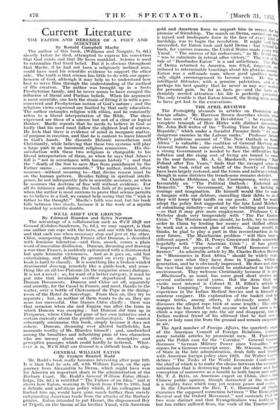GENERAL WILLIAM EATON By Francis Rennell Rodd
Mr. Rodd's book really becomes interesting after page 189. It is then that he sets off, with William Eaton, on the epic journey from Alexandria to Derna, which might have won for America an important share in the administration- of the Barbary Coast. Mr. Rodd's General William Eaton (Rout- ledge, 12s. 6d.) is subtitled " The Failure of an Idea," and it shows how Eaton, working in Tripoli from 1799 to 1805, had a definite and ambitious policy which, if his colleagues had backed him up, would have gone much farther than merely safeguarding American trade from the attacks of the Barbary pirates. Eaton intended to put Hamet, the dispossessed Bey of Tripoli, on the throne of his brother Yusuf, with American -gold-and-American-force to support-him-in--return for hi promise of friendship. The march on Derna, carried out • a mixed. and inadequate force in the face of every kind of hardship, was to begin the revolution. It might well hay, succeeded, for Eaton took and held Derna : but behind Ith -back, for various reasons, the United States made peace wits Nusuf. " The success of his endeavours," as Mr. oddsaw " was to culminAte in retreat after victory." The rest of tb tale of "Bombastes Eaton " is a sad anticlimax. The of Derna returned to America, was feted, forgotten, and reduced to interminable boastings about his glorious wounds, Eaton was a self-made man, 'whose good qualities needed only slight encouragement to become vices. He was u intelligent filibuster, with a genuine patriotism, and it h perhaps his best quality that he never in any way worked for personal gain. So far as facts go—and the filets an. deniably needed attention—his life is perfectly presented The only trouble is that Eaton himself, the living man, seam to have got lost in the excavations.








































 Previous page
Previous page